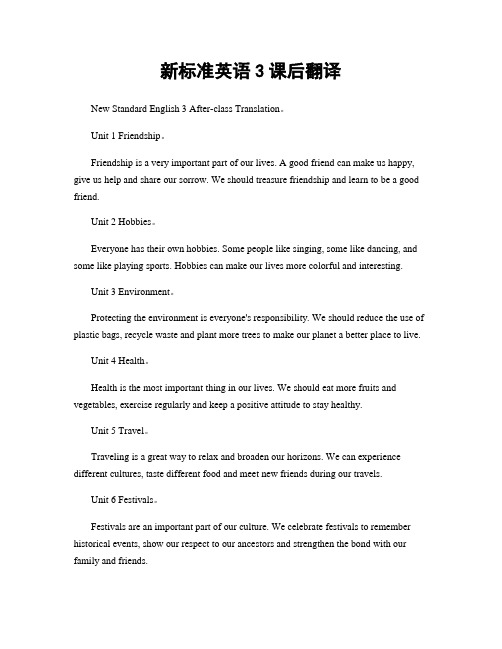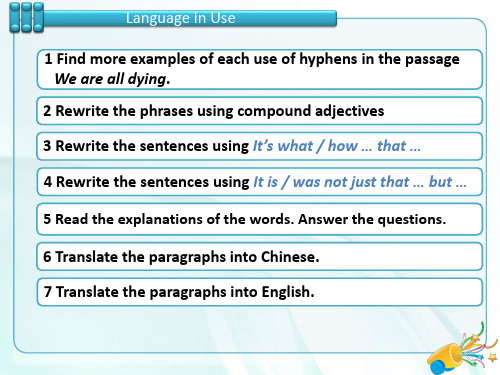新标准大学英语第3册第1单元句子翻译
- 格式:ppt
- 大小:366.00 KB
- 文档页数:6

新标准大学英语3课后翻译Unit 1。
Part I Listening Skills。
1. Script。
M: Hi, Lisa. Are you going to the party tonight?W: No, I have to finish my paper for history class.M: What's the paper about?W: It's about the American Civil War.M: That sounds interesting. I'd love to read it when you're done. W: Sure, I'll let you know when it's finished.2. Translation。
男,嗨,丽莎。
你今晚要去参加派对吗?女,不,我得完成历史课的论文。
男,论文写什么内容?女,是关于美国内战的。
男,听起来很有趣。
写完了告诉我,我想看看。
女,好的,写完了我会通知你的。
Part II Reading Skills。
1. Script。
M: Hi, Sarah. Have you finished reading the novel for our literature class?W: Yes, I finished it yesterday. It's a really good book.M: I'm only halfway through. I need to catch up before our next class.W: You should read a few chapters every day to stay on track.M: Yeah, I'll do that. Thanks for the advice.2. Translation。

新标准英语3课后翻译New Standard English 3 After-class Translation。
Unit 1 Friendship。
Friendship is a very important part of our lives. A good friend can make us happy, give us help and share our sorrow. We should treasure friendship and learn to be a good friend.Unit 2 Hobbies。
Everyone has their own hobbies. Some people like singing, some like dancing, and some like playing sports. Hobbies can make our lives more colorful and interesting.Unit 3 Environment。
Protecting the environment is everyone's responsibility. We should reduce the use of plastic bags, recycle waste and plant more trees to make our planet a better place to live.Unit 4 Health。
Health is the most important thing in our lives. We should eat more fruits and vegetables, exercise regularly and keep a positive attitude to stay healthy.Unit 5 Travel。


We are all dying我们都在走向死亡have some good news and some bad news for you (as the joke goes). The bad news –and I'm very sorry to be the bearer –is that we are all dying. It's true. I've checked it out. In fact, I've double –and triple-checked it. I've had it substantiated and, well, there's no easy way to say it. we are dying. It's something that I always kind of knew, but never really chose to think about too much. But the fact is, within the next 70 or 80 years –depending on how old you are and how long you last – we are all going to be either coffin dwellers or trampled ash in the rose garden of some local cemetery. We may not even last that long. After all, we never quite know when the hooded, scythe-carrying, bringer-of-the-last-breath might come-a-calling. It could be sooner than we'd like. I have watched death from the sidelines, quite recently in fact, and nothing underlines the uncertainty and absolute frailty of humanity like the untimely exit of a friend.我给你带来一条好消息,还有一条坏消息(正如笑话所说的)。

新标准大学英语综合教程3课文翻译(完整版)Unit 1Active reading 1抓螃蟹大学最后一年的秋天,我们的心情变了。
刚刚过去的夏季学期的轻松氛围、即兴球赛、查尔斯河上的泛舟以及深夜晚会都不见了踪影,我们开始埋头学习,苦读到深夜,课堂出勤率再次急剧上升。
我们都觉得在校时间不多了,以后再也不会有这样的学习机会了,所以都下定决心不再虚度光阴。
当然,下一年四五月份的期末考试最为重要。
我们谁都不想考全班倒数第一,那也太丢人了,因此同学们之间的竞争压力特别大。
以前每天下午五点以后,图书馆就空无一人了,现在却要等到天快亮时才会有空座,小伙子们熬夜熬出了眼袋,他们脸色苍白,睡眼惺忪,却很自豪,好像这些都是表彰他们勤奋好学的奖章。
还有别的事情让大家心情焦虑。
每个人都在心里盘算着过几个月毕业离校之后该找份什么样的工作。
并不总是那些心怀抱负、成绩拔尖的高材生才清楚自己将来要做什么,常常是那些平日里默默无闻的同学早早为自己下几个阶段的人生做好了规划。
有位同学在位于麦迪逊大道他哥哥的广告公司得到了一份工作,另一位同学写的电影脚本已经与好莱坞草签了合约。
我们当中野心最大的一位同学准备到地方上当一个政党活动家,我们都预料他最终会当上参议员或国会议员。
但大多数同学不是准备继续深造,就是想在银行、地方政府或其他单位当个白领,希望在20 出头的时候能挣到足够多的薪水,过上舒适的生活,然后就娶妻生子,贷款买房,期望升职,过安稳日子。
感恩节的时候我回了一趟家,兄弟姐妹们免不了不停地问我毕业后有什么打算,我不知道该说什么。
实际上,我知道该说什么,但我怕他们批评我,所以只对他们说了别人都准备干什么。
父亲看着我,什么也没说。
夜深时,他叫我去他的书房。
我们坐了下来,他给我们俩各倒了杯饮料。
“怎么样?”他问。
“啊,什么怎么样?”“你毕业后到底想做什么?”他问道。
父亲是一名律师,我一直都认为他想让我去法学院深造,追随他的人生足迹,所以我有点儿犹豫。

新标准大学英语3课文翻译Unit 1 Friendship。
Part I Pre-reading Task。
1. The text is about friendship and the importance of friendship in our lives.2. The text is likely to discuss the qualities of a good friend and the benefits of having good friends.3. I think the text will be interesting and informative, and it will provide insights into the value of friendship.Part II Text A。
Friendship。
Friendship is one of the most precious things in our lives. It is a relationship that brings joy and support, and it is something that many people cherish deeply. Friends are the people we can rely on, share our thoughts and feelings with, and have fun with. A good friend is someone who is there for you in times of need, who listens to you without judgment, and who understands you even when you don't say a word.Part III Text B。
新标准大学英语综合教程3课文翻译Unit 1 Friendship。
Part I Pre-reading Task。
Friendship is a topic that everyone can relate to. We all have friends, and we all value the connections we have with them. In this unit, we will explore the theme of friendship from different angles and perspectives. Before we delve into the text, take a moment to think about what friendship means to you. What qualities do you value in a friend? How do you nurture and maintain your friendships? Reflecting on these questions will help you engage with the text more deeply.Part II Text A。
1. Friendship。
Friendship is one of the most important relationships we cultivate in our lives. It is a bond that brings joy, support, and companionship. In this text, we will read about the experiences of two friends, Lucy and Lily, and how their friendship evolves over time. As you read, pay attention to the dynamics of their relationship and the challenges they face. Think about how their story relates to your own experiences with friends.2. Text A Translation。
新标准⼤学英语综合3课⽂翻译(1-10单元30篇)概要Unit 1-1Catching crabs1 In the fall of our final year, our mood changed. The relaxed atmosphere of the preceding summer semester, the impromptu ball games, the boating on the Charles River, the late-night parties had disappeared, and we all started to get our heads down, studying late, and attendance at classes rose steeply again. We all sensed we were coming to the end of our stay here, that we would never get a chance like this again, and we became determined not to waste it. Most important of course were the final exams in April and May in the following year. No one wanted the humiliation of finishing last in class, so the peer group pressure to work hard was strong. Libraries which were once empty after five o'clock in the afternoon were standing room only until the early hours of the morning, and guys wore the bags under their eyes and their pale, sleepy faces with pride, like medals proving their diligence.2 But there was something else. At the back of everyone's mind was what we would do next, when we left university in a few months' time. It wasn't always the high flyers with the top grades who knew what they were going to do. Quite often it was the quieter, less impressive students who had the next stages of their life mapped out. One had landed a job in his brother's advertising firm in Madison Avenue, another had got a script under provisional acceptance in Hollywood. The most ambitious student among us was going to work as a party activist at a local level. We all saw him ending up in the Senate or in Congress one day. But most people were either looking to continue their studies, or to make a living with a white-collar job in a bank, local government, or anything which would pay them enough to have a comfortable time in their early twenties, and then settle down with a family, a mortgage and some hope of promotion.3 I went home at Thanksgiving, and inevitably, my brothers and sisters kept asking me what I was planning to do. I didn't know what to say. Actually, I did know what to say, but I thought they'd probably criticize me, so I told them what everyone else was thinking of doing.4 My father was watching me but saying nothing. Late in the evening, he invited me to his study. We sat down and he poured 抓螃蟹1.⼤学最后⼀年的秋天,我们的⼼情变了。
Catching Crabs1 In the fall of our final year, our mood changed. the relaxed atmosphere of the preceding summer semester, the impromptu ball games, the boating on the Charles River, the late-night parties had disappeared, and we all started to get our heads down, studying late, and attendance at classes rose steeply again. We all sensed we were coming to the end of our stay here, that we would never get a chance like this again, and we became determined not to waste it. Most important of course were the final exams in April and May in the following year. No one wanted the humiliation of finishing last in class, so the peer group pressure to work hard was strong. Libraries which were once empty after five o'clock in the afternoon were standing room only until the early hours of the morning, and guys wore the bags under their eyes and their pale, sleepy faces with pride, like medals proving their diligence.大学最后一年的秋天,我们的心情变了。
新标准大学英语综合教程3课文翻译Unit 1: GlobalizationText AGlobalization is defined as the increasing interconnectedness and interdependence of countries through the exchange of goods, services, and ideas. With the rapid development of technology and transportation, globalization has become a dominant force shaping the world we live in.The benefits of globalization are evident in various aspects of our lives. Economically, it has created new market opportunities and allowed businesses to expand their reach beyond domestic boundaries. This has contributed to economic growth and job creation. Culturally, globalization has facilitated the exchange of cultural practices, ideas, and values, leading to a more diverse and interconnected world. It has also accelerated the spread of knowledge and information, making education more accessible and enabling the growth of scientific advancements.However, globalization also comes with challenges. One major concern is the growing wealth gap between the rich and the poor. While globalization has lifted many out of poverty, it has also widened income inequality within and between countries. Additionally, globalization has led to the homogenization of cultures, as dominant cultures tend to overshadow smaller, local ones. This can result in the loss of cultural diversity and traditions. To address these challenges, policymakers need to find ways toensure that the benefits of globalization are shared by all. This includes implementing fair trade practices, promoting sustainable development, and investing in education and healthcare. Furthermore, it is crucial to celebrate and preserve cultural diversity, respecting and valuing the unique contributions of different societies.In conclusion, globalization has drastically transformed the world we live in, bringing both benefits and challenges. By addressing these challenges head-on, we can create a more inclusive and sustainable global community that embraces diversity and promotes shared prosperity.Text BOver the past few decades, globalization has become an undeniable reality in our society. It is driven by factors such as advancements in technology, international trade, and the rapid flow of capital and information.Globalization has had a profound impact on the economy, politics, culture, and daily life of people around the world. Economically, it has allowed businesses to expand their operations globally, leading to increased trade and investment. Politically, it has fostered cooperation among nations and encouraged the formation of international organizations and agreements. Culturally, globalization has facilitated the exchange of ideas, art, music, and cuisine, resulting in a more interconnected and multicultural world. In our daily lives, globalization has made it easier for us to travel, communicate, and access products and services from differentparts of the world.However, globalization has also faced criticism and resistance. Critics argue that it often benefits multinational corporations and developed countries at the expense of developing nations and local communities. They claim that globalization promotes exploitation, weakens labor rights, and leads to the loss of traditional industries and jobs.Despite the challenges and criticisms, it is clear that globalization is here to stay. As our world becomes increasingly interconnected, it is essential to find ways to maximize its benefits while mitigating its negative effects. This requires strong international cooperation and policies that promote sustainable and inclusive growth.In conclusion, globalization is a complex and multifaceted phenomenon that has significantly shaped our world. While it has brought about many positive changes, it also poses challenges that need to be addressed. Only through effective governance and cooperation can we harness the potential of globalization for the betterment of all.。